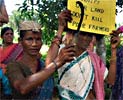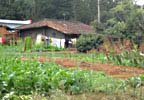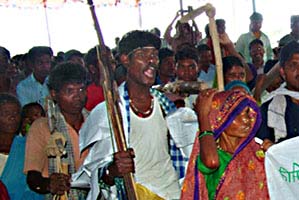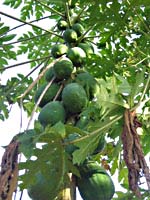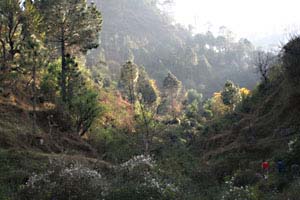Mining Giant Vedanta Under Fire Again
at Shareholders Meeting
Villagers from Niyamgiri, Odisha: 'What development do you mean?'
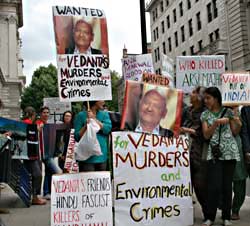 'Anil Agarwal, Murderer, Murderer' people shout in the respectable Great George Street
in the hart of London. Agrawal is chairman and majority-shareholder of Vedanta.
'Anil Agarwal, Murderer, Murderer' people shout in the respectable Great George Street
in the hart of London. Agrawal is chairman and majority-shareholder of Vedanta.
'Anil Agarwal, Blood on Your Hands', 'Anil Agarwal, Murderer, Murderer' people shout in the respectable Great George Street
in the hart of London at July 28, 2010. Agarwal is chairman and majority-shareholder of the Indian mining and metal
giant Vedanta. The company is listed at the London Stock Exchange and that is the reason it has its annual shareholders meeting here. For
the fourth year on a row, protesters are there: 75 people from different ngos, from an Indian Human Rights group, from Survival International
(indigenous peoples' rights), Amnesty International (human rights) and Action Aid (development). They came to criticize the bauxite refinery
the company built in the East-Indian state Orissa. The refinery causes a lot of pollution. Already several villagers died of tuberculosis. Many
got blisters and other skin problems after bathing in the polluted water. More photos
Vedanta also wants to start bauxite mining in this area at the Niyamgiri hill. Then the streams will dry up and the local people, Dongria Kondh
tribals and dalits (lowest cast), will have no other choice then to leave their land. It will be difficult if not impossible to find a job in
the city. With losing their land, they will lose everything.
For several decades these villagers resist. Several years ago some big international NGOs picked up their case. They asked investors to
withdraw their money. They bought some shares to visit the annual meeting and ask serious questions.
This combination of well decided stubborn local struggle with high level lobbying in London and media-attractive actions works well. 'Vedanta
Resources: the world's most hated company?' took The Independent as a headline the day after the shareholders meeting. 'Vedanta's bad press risks
undermining its image', put Financial Times at the top of its article.
The Wall Street Journal wrote: "The OECD last year issued a public denouncement of Vedanta for failing to put in place an adequate and
timely consultation mechanism to engage the Dongria Kondh (..) Vedanta CEO MS Mehta said the company has already held extensive consultations
with the local community. Some investors remain to be convinced. Aviva Investors, for instance, denounced Vedanta's lack of engagement with
shareholders and its disregard for international guidelines on corporate practices.' The Independent: "Earlier this month PGGM, the Dutch
health sector pension fund sold its €5.8m stake, saying that efforts to discuss the Orissa project had failed for two years. PGGM's comments
echo those of the Church of England, which (..) also sold its holding in Vedanta."
Letter from the villagers from Niyamgiri, Odisha
In the shareholders meeting human rights activist Bianca Jagger gave a box to Vedanta chairman Agarwal with 31.000 signatures of concerned people,
collected by Amnesty International. She also read out a letter from Orissa villagers:
"Dear Bianca Madam,
Greetings from us at Niyamgiri!
We thank you profusely for taking so much trouble to come down to our
villages and interact with us. We are glad that you patiently heard our
voices and saw the painful real life situation we now live in.
For the past three years, we have attended Vedanta AGM and raised questions,
as you witnessed last year. But it is not possible to do so every year, thus
we request you take our concerns to Vedanta AGM and ask questions to the
board and the shareholders present on our behalf:
1. Because of conveyer belt construction two perennial streams have dried
up that we used to cultivate vegetable, cereals, pulses round the year. Tell
us what would happen to the rivers and streams when Niyamgiri is mined?
2. Why people are not paid compensation for the land that Vedanta has
acquired forcefully? (example village Jagannathpur, Tudra Majhi, Sambru
Majhi and Mala Dei; Khata no. 53, plot no. 285 and area of land is 0.688
hectare). How would you compensate for all the land you have forcefully
taken from us?
3. We are suffering from TB and skin diseases because of pollution caused
by your refinery but Vedanta claims to provide health care that we have not
seen. Where is the healthcare that you talk about and that our people now
need so much?
4. For generations we depended on sustainable livelihoods drawn from
Niyamgiri. You are trying to destroying that. Your income generating
initiatives like strawberry cultivation, leaf plate stitching using machine
and phenol product have failed. You have failed to keep your promise and
provide job to local tribal youths.
What development do you mean - Your Profit at Our Cost?!
We continue to claim our socio-economic and cultural rights over Niyamgiri
and urge you not to destroy our only source of survival in the name of so
called development. We request solidarity from all shareholders in our
struggle.
In Solidarity, Community members from Niyamgiri."
The villagers from Orissa go on with their struggle, international attention from activists is growing, and the financial world is worrying. It gives hope for the future. PS: August 2010 the Indian government decided not to allow Vedanta to mine bauxite in Odisha. Lateron the government brought down the production of aluminum ore of the Vedanta bauxite refinery in Odisha with 80 per cent. Read more
Go to next page: photo series shareholders meeting Vedanta in London
Go to back-ground article about the struggle of the Kondh against multinational Vedanta Go to overview articles and photo series Odisha
